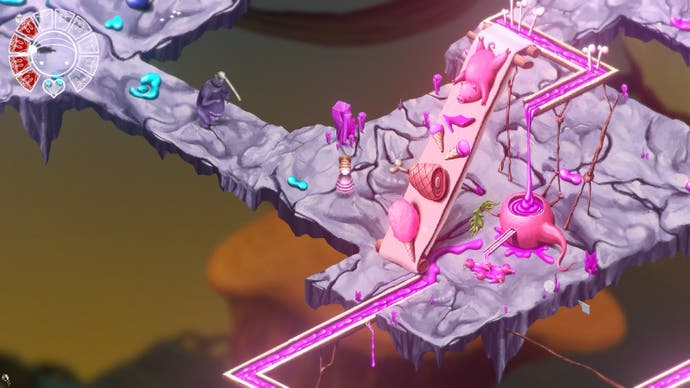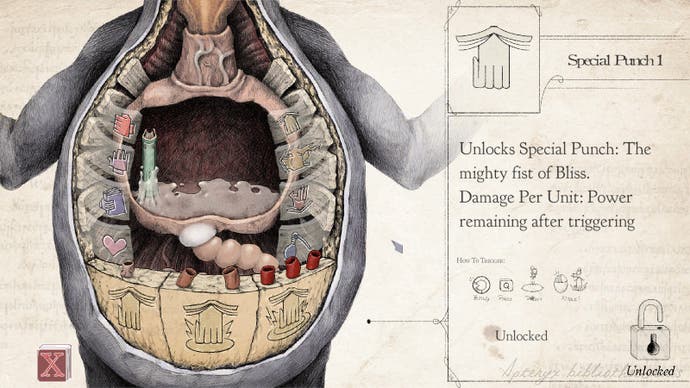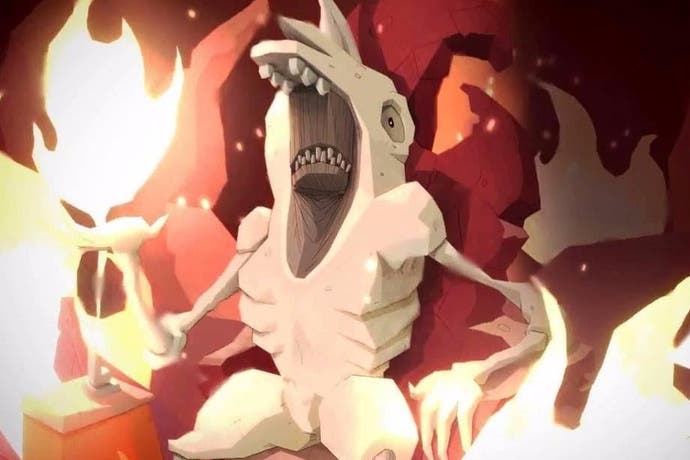Quote is a brawler for the post-truth era
Book club.
Freedom of expression is a fine thing, but I'm sure everybody reading this has, at some point, gazed over the face of the internet - all those clashing feeds and interpretations, that perpetual shimmer of New - and yearned for some way of clubbing and stomping the whole, gorgeous mess back into Stone Age silence. It's a yearning Quote, an unusually well-spoken isometric brawler from London-based Vindit, tackles with bruising force.
In Quote you play Novella, a pugilist princess enslaved by Bliss, velvety-voiced god of Ignorance, and turned loose on a hand-drawn fantasy world in search of renegade thinkers to rough up and books to feed to an obese AI accomplice known as Tatters. These books, tucked away in separately loading dungeons scattered across a series of lurid, fractured environments, are also your means of unlocking new combat moves - a familiar process made ghastly by an upgrades screen that shows you the inside of your ally's stomach, where captured tomes moulder gently till selected for digestion.

It's a nasty little structural critique of the sausage-factory conveyor belt that is "levelling up" in any given RPG - nuance boiled off, the diverse elements of a world melted down into homogeneous "experience points". But beyond that, the game is a meditation on how knowledge at large is often treated more as ammunition than for its own sake. While exploring you can gather trails of letters to form throwaway sentences that lower an associated dungeon's difficulty, filling glands in Novella's hollowed-out cranium with fizzy fluid - a mechanic that evokes the magpie way people debate online, ripping the odd useful phrase or piece of trivia from a book to hammer an argument home with small regard for its context.
If all this sounds too literary for comfort, know that Quote is (so far) a remarkably savage if not especially deep brawler. A toddler in bulbous skirts with a jaunty coral cowl, Novella doesn't look like she'd be much use in a fight, but in practice she's a regular Brownshirt - streaking across the screen to administer a shattering beatdown, the camera rattling under the bombardment as the dynamic score surges to a bullying crescendo. If her fists alone aren't enough, Novella can bat enemies about with an enormous hardbacked volume, in one of the game's more on-the-nose metaphors. Between scraps, you can also hurl the book and teleport to it to cross gulfs, though you'll need to make sure that Tatters can follow.

The game looks both handsome and horrendous, its floating architecture littered with mangled bodies and pop motifs, like a Hieronymous Bosch painting of the E3 show floor after a brisk day's trading. Memorable sights include an underground printing operation where penguins, ice cream cones and elephants are squished to create different shades of ink, and a gigantic, sleeping frog who holds up a section of the level, its breath roaring in your ears as you pass. Having completed the first chapter and mooched about a little in the second - where fishermen dangle hooks into the swirling heavens in hopes of snaring a stray fact - I'm eager to see what awaits further into the game.
I'm also keen to find out more about Bliss, your overlord, whose divine missives thrust themselves across the view like Slack messages from a particularly obnoxious line manager. Bliss is very much a pantomime villain, chuckling as you pound hapless authors into paste, but again, there's something disturbingly relatable about his desire to purge his kingdom of unrestrained thought and chatter, grinding away at its exhausting capacity for self-expression. As coder and designer Robin Lacey tells me: "If you are surrounded by fragments of knowledge and it's all nonsense, how do you construct yourself? And is that a way to live?" Punching probably isn't the best answer to that question, but it's certainly cathartic.
Disclaimer: Eurogamer contributors Alec Meer and Daniel Griliopoulos have written material for Quote.
